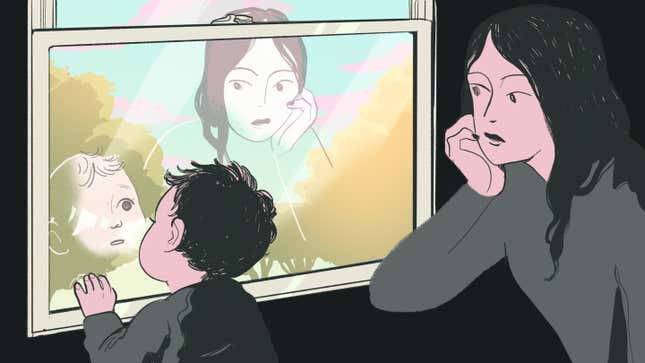Becoming a Mother in the Isolation of the Pandemic
Latest
Illustration: Vicky Leta
I was heavily pregnant with my first child as the covid-19 pandemic gathered pace. I spent a lot of time doom-scrolling in those Spring months. I anxiously, and often angrily, tracked the bans on birth partners in New York City hospitals, and the separations of mothers presumed to have covid from their newborns. I worried about the disruption of routine healthcare. Mostly, I was focused on birth. But by the time my daughter’s due date approached, I had also begun to worry about what it would be like to welcome a new baby without our friends and family around us, in relative isolation.
Those same friends and family did their best to put my mind at ease, arguing that being home with a newborn isn’t that different from shelter-in-place. In some ways, they were right. In the haze of broken sleep and consuming, round-the-clock care of a newborn, I didn’t have time to think about whether I was living through a pandemic. As it turns out, though, babies just keep getting bigger. The pandemic just kept getting bigger, too. As I emerged from the sleepless fourth trimester, I began to wonder about the longer-term significance of becoming a parent during the pandemic. What does it mean to become a parent in private, largely isolated from the world outside of the home?
What does it mean to become a parent in private, largely isolated from the world outside of the home?
Becoming a parent outside of normal forms of community is a seismic shift. Like many new parents of the pandemic age, I have yet to learn how to care for my child out in the world, and while spending time with others. With my husband and I both home all the time with my daughter, we have pretty much never been alone as a couple without our child. I also fundamentally lack a register for my own parenting. How risk-averse am I? How flexible? How high strung or relaxed? These aren’t things one gauges in isolation, but in relation to others. My partner and I only know how to be parents, and only know ourselves as parents, on our own. We’re exhausted, for sure, and uncertain of our place.
Over the last year, parents have had to grapple with more isolation and less social support. The degree of social isolation experienced by families during the pandemic has varied along socio-economic and racial lines, as wealthier households have managed to insulate themselves to a greater extent from covid risks. But for all parents whose children were already off at daycare or school or even college, and were suddenly thrust back into the home in the spring of 2020, life derailed (and is still derailing) into chaos. Employers largely wouldn’t or couldn’t accommodate the new caregiving responsibilities of employees, and families—most of all mothers—have had to pick up the pieces. Well before the pandemic, women did significantly more childcare and household labor than men. This has only continued to be the case as the overall burden of unpaid labor for families has increased, and the work of schooling and caring for children rendered even less visible to the world outside of families.
-

-

-

-

-

-

-

-

-

-

-

-

-

-

-

-

-

-

-

-

-

-

-

-

-

-

-

-

-

-

-

-

-

-

-

-

-

-

-

-








































